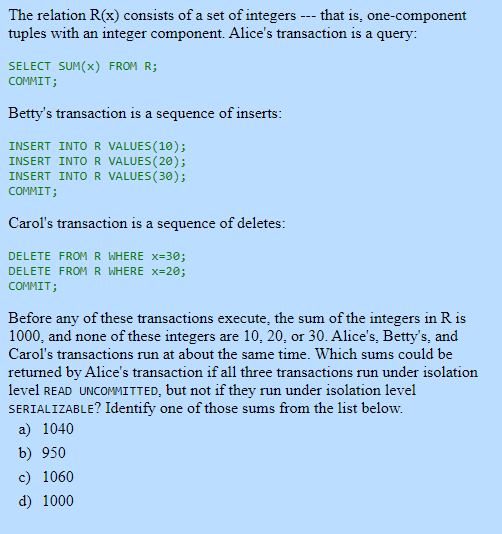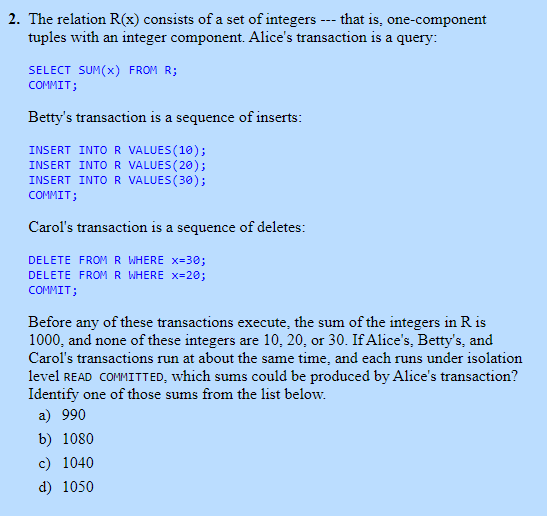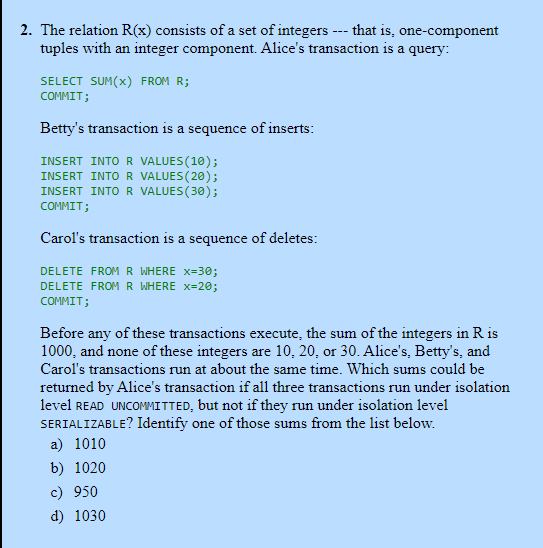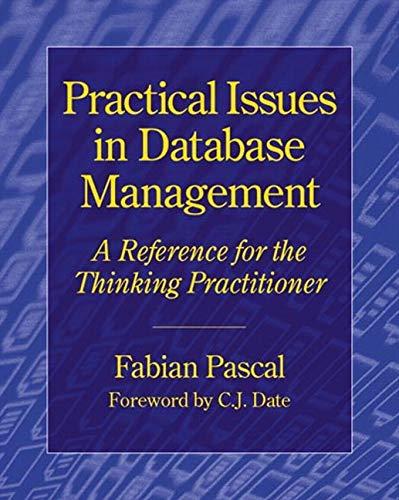Answered step by step
Verified Expert Solution
Question
1 Approved Answer
PLEASE EXPLAIN ALL OF THEM The relation R(x) consists of a set of integers --- that is, one-component tuples with an integer component. Alice's transaction
PLEASE EXPLAIN ALL OF THEM






 The relation R(x) consists of a set of integers --- that is, one-component tuples with an integer component. Alice's transaction is a query: SELECTSUM(x) FROM R; COMMIT; Betty's transaction is a sequence of inserts: INSERT INTO R VALUES(10); INSERT INTO R VALUES(20); INSERT INTO R VALUES(30); COMMIT; Carol's transaction is a sequence of deletes: DELETE FROM R WHERE x=30; DELETE FROM R WHERE x=20; COMMIT; Before any of these transactions execute, the sum of the integers in R is 1000 , and none of these integers are 10,20, or 30. Alice's, Betty's, and Carol's transactions run at about the same time. Which sums could be returned by Alice's transaction if all three transactions run under isolation level READ UNCOMMITTED, but not if they run under isolation level SERIALIZABLE? Identify one of those sums from the list below. a) 1040 b) 950 c) 1060 d) 1000 2. The relation R(x) consists of a set of integers --- that is, one-component tuples with an integer component. Alice's transaction is a query: SELECTSUM(x) FROM R; COMMIT; Betty's transaction is a sequence of inserts: INSERT INTO R VALUES(10); INSERT INTO R VALUES(20); INSERT INTO R VALUES(30); COMMIT; Carol's transaction is a sequence of deletes: DELETE FROM R WHERE x=30; DELETE FROM R WHERE x=20; COMMIT; Before any of these transactions execute, the sum of the integers in R is 1000 , and none of these integers are 10,20, or 30. If Alice's, Betty's, and Carol's transactions run at about the same time, and each runs under isolation level READ COMITTED, which sums could be produced by Alice's transaction? Identify one of those sums from the list below. a) 990 b) 1080 c) 1040 d) 1050 2. The relation R(x) consists of a set of integers --- that is, one-component tuples with an integer component. Alice's transaction is a query: SELECTSUM(x) FROM R; COMMIT; Betty's transaction is a sequence of inserts: INSERT INTO R VALUES(10); INSERT INTO R VALUES(20); INSERT INTO R VALUES(30); COMMIT; Carol's transaction is a sequence of deletes: DELETE FROM R WHERE x=30; DELETE FROM R WHERE x=20; COMMIT; Before any of these transactions execute, the sum of the integers in R is 1000 , and none of these integers are 10,20 , or 30 . Alice's, Betty's, and Carol's transactions run at about the same time. Which sums could be returned by Alice's transaction if all three transactions run under isolation level READ UNCOMMITTED, but not if they run under isolation level SERIALIZABLE? Identify one of those sums from the list below. a) 1010 b) 1020 c) 950 d) 1030 The relation R(x) consists of a set of integers --- that is, one-component tuples with an integer component. Alice's transaction is a query: SELECTSUM(x) FROM R; COMMIT; Betty's transaction is a sequence of inserts: INSERT INTO R VALUES(10); INSERT INTO R VALUES(20); INSERT INTO R VALUES(30); COMMIT; Carol's transaction is a sequence of deletes: DELETE FROM R WHERE x=30; DELETE FROM R WHERE x=20; COMMIT; Before any of these transactions execute, the sum of the integers in R is 1000 , and none of these integers are 10,20, or 30. Alice's, Betty's, and Carol's transactions run at about the same time. Which sums could be returned by Alice's transaction if all three transactions run under isolation level READ UNCOMMITTED, but not if they run under isolation level SERIALIZABLE? Identify one of those sums from the list below. a) 1060 b) 950 c) 1040 d) 1010 The relation R(x) consists of a set of integers --- that is, one-component tuples with an integer component. Alice's transaction is a query: SELECTSUM(x) FROM R; COMMIT; Betty's transaction is a sequence of inserts: INSERT INTO R VALUES(10); INSERT INTO R VALUES(20); INSERT INTO R VALUES(30); COMMIT; Carol's transaction is a sequence of deletes: DELETE FROM R WHERE x=30; DELETE FROM R WHERE x=20; COMMIT; Before any of these transactions execute, the sum of the integers in R is 1000 , and none of these integers are 10,20, or 30. If Alice's, Betty's, and Carol's transactions run at about the same time, and each runs under isolation level READ COMITTED, which sums could be produced by Alice's transaction? Identify one of those sums from the list below. a) 1040 b) 990 c) 950 d) 1020 The relation R(x) consists of a set of integers --- that is, one-component tuples with an integer component. Alice's transaction is a query: SELECT SUM(x) FROM R; COMMIT; Betty's transaction is a sequence of inserts: INSERT INTO R VALUES(10); INSERT INTO R VALUES(20); INSERT INTO R VALUES(30); COMMIT; Carol's transaction is a sequence of deletes: DELETE FROM R WHERE x=30; DELETE FROM R WHERE x=20; COMMIT; Before any of these transactions execute, the sum of the integers in R is 1000 , and none of these integers are 10,20, or 30. Alice's, Betty's, and Carol's transactions run at about the same time. Which sums could be returned by Alice's transaction if all three transactions run under isolation level READ UNCOMMITTED, but not if they run under isolation level SERIALIZABLE? Identify one of those sums from the list below. a) 1040 b) 1010 c) 950 d) 1020 The relation R(x) consists of a set of integers --- that is, one-component tuples with an integer component. Alice's transaction is a query: SELECTSUM(x) FROM R; COMMIT; Betty's transaction is a sequence of inserts: INSERT INTO R VALUES(10); INSERT INTO R VALUES(20); INSERT INTO R VALUES(30); COMMIT; Carol's transaction is a sequence of deletes: DELETE FROM R WHERE x=30; DELETE FROM R WHERE x=20; COMMIT; Before any of these transactions execute, the sum of the integers in R is 1000 , and none of these integers are 10,20, or 30 . Alice's, Betty's, and Carol's transactions run at about the same time. Which sums could be returned by Alice's transaction if all three transactions run under isolation level READ UNCOMMITTED, but not if they run under isolation level SERIALIZABLE? Identify one of those sums from the list below. a) 950 b) 1020 c) 1040 d) 1000
The relation R(x) consists of a set of integers --- that is, one-component tuples with an integer component. Alice's transaction is a query: SELECTSUM(x) FROM R; COMMIT; Betty's transaction is a sequence of inserts: INSERT INTO R VALUES(10); INSERT INTO R VALUES(20); INSERT INTO R VALUES(30); COMMIT; Carol's transaction is a sequence of deletes: DELETE FROM R WHERE x=30; DELETE FROM R WHERE x=20; COMMIT; Before any of these transactions execute, the sum of the integers in R is 1000 , and none of these integers are 10,20, or 30. Alice's, Betty's, and Carol's transactions run at about the same time. Which sums could be returned by Alice's transaction if all three transactions run under isolation level READ UNCOMMITTED, but not if they run under isolation level SERIALIZABLE? Identify one of those sums from the list below. a) 1040 b) 950 c) 1060 d) 1000 2. The relation R(x) consists of a set of integers --- that is, one-component tuples with an integer component. Alice's transaction is a query: SELECTSUM(x) FROM R; COMMIT; Betty's transaction is a sequence of inserts: INSERT INTO R VALUES(10); INSERT INTO R VALUES(20); INSERT INTO R VALUES(30); COMMIT; Carol's transaction is a sequence of deletes: DELETE FROM R WHERE x=30; DELETE FROM R WHERE x=20; COMMIT; Before any of these transactions execute, the sum of the integers in R is 1000 , and none of these integers are 10,20, or 30. If Alice's, Betty's, and Carol's transactions run at about the same time, and each runs under isolation level READ COMITTED, which sums could be produced by Alice's transaction? Identify one of those sums from the list below. a) 990 b) 1080 c) 1040 d) 1050 2. The relation R(x) consists of a set of integers --- that is, one-component tuples with an integer component. Alice's transaction is a query: SELECTSUM(x) FROM R; COMMIT; Betty's transaction is a sequence of inserts: INSERT INTO R VALUES(10); INSERT INTO R VALUES(20); INSERT INTO R VALUES(30); COMMIT; Carol's transaction is a sequence of deletes: DELETE FROM R WHERE x=30; DELETE FROM R WHERE x=20; COMMIT; Before any of these transactions execute, the sum of the integers in R is 1000 , and none of these integers are 10,20 , or 30 . Alice's, Betty's, and Carol's transactions run at about the same time. Which sums could be returned by Alice's transaction if all three transactions run under isolation level READ UNCOMMITTED, but not if they run under isolation level SERIALIZABLE? Identify one of those sums from the list below. a) 1010 b) 1020 c) 950 d) 1030 The relation R(x) consists of a set of integers --- that is, one-component tuples with an integer component. Alice's transaction is a query: SELECTSUM(x) FROM R; COMMIT; Betty's transaction is a sequence of inserts: INSERT INTO R VALUES(10); INSERT INTO R VALUES(20); INSERT INTO R VALUES(30); COMMIT; Carol's transaction is a sequence of deletes: DELETE FROM R WHERE x=30; DELETE FROM R WHERE x=20; COMMIT; Before any of these transactions execute, the sum of the integers in R is 1000 , and none of these integers are 10,20, or 30. Alice's, Betty's, and Carol's transactions run at about the same time. Which sums could be returned by Alice's transaction if all three transactions run under isolation level READ UNCOMMITTED, but not if they run under isolation level SERIALIZABLE? Identify one of those sums from the list below. a) 1060 b) 950 c) 1040 d) 1010 The relation R(x) consists of a set of integers --- that is, one-component tuples with an integer component. Alice's transaction is a query: SELECTSUM(x) FROM R; COMMIT; Betty's transaction is a sequence of inserts: INSERT INTO R VALUES(10); INSERT INTO R VALUES(20); INSERT INTO R VALUES(30); COMMIT; Carol's transaction is a sequence of deletes: DELETE FROM R WHERE x=30; DELETE FROM R WHERE x=20; COMMIT; Before any of these transactions execute, the sum of the integers in R is 1000 , and none of these integers are 10,20, or 30. If Alice's, Betty's, and Carol's transactions run at about the same time, and each runs under isolation level READ COMITTED, which sums could be produced by Alice's transaction? Identify one of those sums from the list below. a) 1040 b) 990 c) 950 d) 1020 The relation R(x) consists of a set of integers --- that is, one-component tuples with an integer component. Alice's transaction is a query: SELECT SUM(x) FROM R; COMMIT; Betty's transaction is a sequence of inserts: INSERT INTO R VALUES(10); INSERT INTO R VALUES(20); INSERT INTO R VALUES(30); COMMIT; Carol's transaction is a sequence of deletes: DELETE FROM R WHERE x=30; DELETE FROM R WHERE x=20; COMMIT; Before any of these transactions execute, the sum of the integers in R is 1000 , and none of these integers are 10,20, or 30. Alice's, Betty's, and Carol's transactions run at about the same time. Which sums could be returned by Alice's transaction if all three transactions run under isolation level READ UNCOMMITTED, but not if they run under isolation level SERIALIZABLE? Identify one of those sums from the list below. a) 1040 b) 1010 c) 950 d) 1020 The relation R(x) consists of a set of integers --- that is, one-component tuples with an integer component. Alice's transaction is a query: SELECTSUM(x) FROM R; COMMIT; Betty's transaction is a sequence of inserts: INSERT INTO R VALUES(10); INSERT INTO R VALUES(20); INSERT INTO R VALUES(30); COMMIT; Carol's transaction is a sequence of deletes: DELETE FROM R WHERE x=30; DELETE FROM R WHERE x=20; COMMIT; Before any of these transactions execute, the sum of the integers in R is 1000 , and none of these integers are 10,20, or 30 . Alice's, Betty's, and Carol's transactions run at about the same time. Which sums could be returned by Alice's transaction if all three transactions run under isolation level READ UNCOMMITTED, but not if they run under isolation level SERIALIZABLE? Identify one of those sums from the list below. a) 950 b) 1020 c) 1040 d) 1000 Step by Step Solution
There are 3 Steps involved in it
Step: 1

Get Instant Access to Expert-Tailored Solutions
See step-by-step solutions with expert insights and AI powered tools for academic success
Step: 2

Step: 3

Ace Your Homework with AI
Get the answers you need in no time with our AI-driven, step-by-step assistance
Get Started


